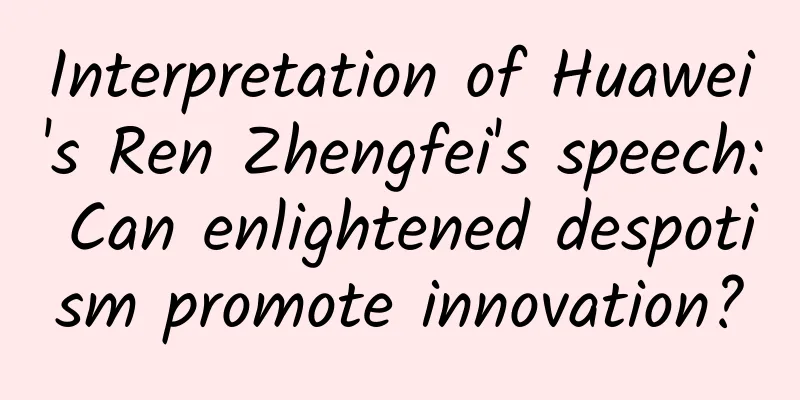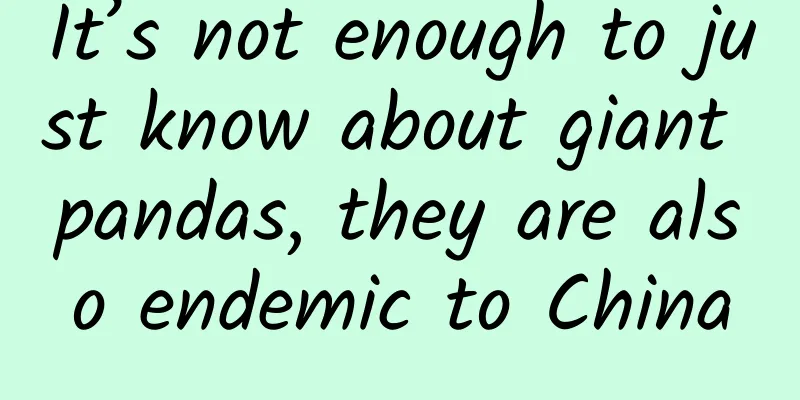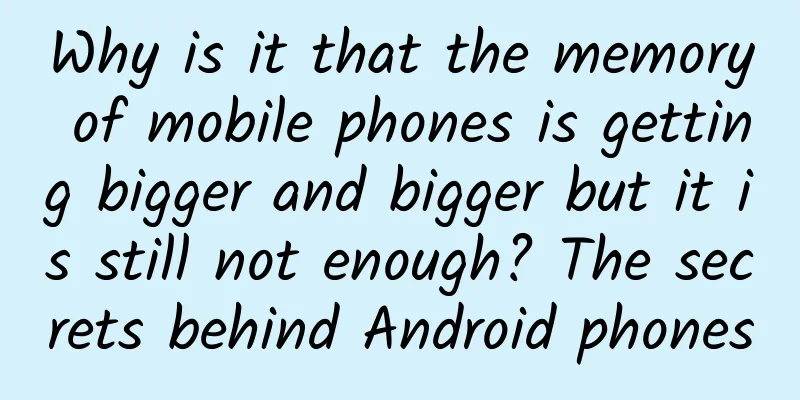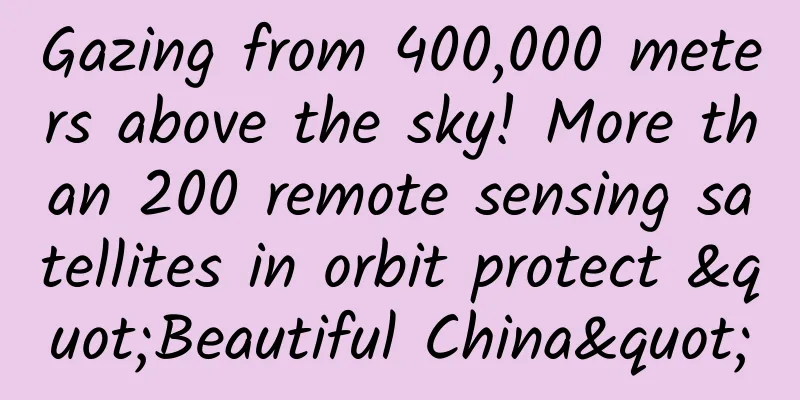Interpretation of Huawei's Ren Zhengfei's speech: Can enlightened despotism promote innovation?

|
In 2012, President Ren Zhengfei held a meeting with scientists from Huawei's "Noah's Ark Laboratory" , and the minutes were published in various media. Recently, President Ren Zhengfei's speech at the fourth quarter regional presidents' meeting was published again, and the minutes were also published in various media. From these two speeches with a wide span, we can actually read a certain consistency, and we have reason to believe that this consistency also clearly reflects the essential characteristics of Huawei as a company. This article attempts to interpret this a little, which may not be correct. Paradigms of organization and management There can be many companies and even non-profit organizations, but there are not many corresponding organizational paradigms. From the perspective of power distribution and the degree of centralization, there are only four basic paradigms: one is rule by one person, one is rule by a few people, one is rule by the majority, and one is rule by no one. One person's rule is dictatorship, and no one's rule is self-organization. The degree of individualization varies greatly in different paradigms. The more self-organized, the higher the degree of individualization. Conversely, more emphasis will be placed on collectivism. These four levels can be divided into countless subtle levels, and companies always have to find a position in them. But in general, companies are more inclined to minority rule due to the extremely harsh competitive environment. The specific subtle level depends on the characteristics of people and careers. For example, Google is a "clean" company, and what one person does can be amplified into immeasurable value with a high leverage ratio. In that case, its organization must emphasize individuality more. But for companies like Huawei, which started out as a communications company, the work they have to do is more "dirty and tiring", so collective collaboration is more critical. As a result, they must emphasize collectivism and work together. After gathering people together, there must always be a specific way to manage them, which involves the paradigm of management. There are roughly two management paradigms, one is management based on numbers, and the other is management based on ideology. Management based on numbers can be traced back to Ford's Ten Blue Bloods and Taylor's scientific management, while management based on ideology has a longer history in our country. Huang Renyu believes in "The Great History of China" that ancient Chinese dynasties have actually been using management methods based on ideology. Modern companies must use both, but the more they emphasize collectivism, the higher the requirements for ideological management, that is, they need stronger values. Judging from the speeches of President Ren Zhengfei, Huawei emphasizes minority rule, or enlightened despotism, in terms of organizational paradigm. In terms of management paradigm, Huawei has both. Digital management is the foundation, which is positive, while ideological management is strange. However, Huawei is a company with strong values. Specifically, this strong value is collectivism, but it uses all means to ensure fairness and justice. By understanding the organizational and management paradigms mentioned above, you will be able to better understand President Ren Zhengfei’s speech. Possible driving force behind the speech If we compare an organization to a giant composed of many people as Hobbes did, then obviously the first thing this giant needs to clarify is "Why do I need to exist?" On this basis, there are three types of work that need to be done simultaneously: the first is to maximize the power of the collective strength of the people in order to better accomplish their mission; the second is to choose the direction of travel; the third is to deal with relationships with external organizations, which is usually manifested as collaboration, confrontation, etc. Huawei obviously also has to face these three types of work, and these three types of work reflect the three difficult problems that large companies must solve: 1. When choosing a direction, you need to solve the problem of how to face the market and innovation. 2. How to deal with relationships with external organizations involves a series of issues such as competition, national security, patents, public relations, and law. 3. In order to maximize the collective strength of everyone internally, we must solve the issue of fairness, equal opportunities and equal treatment. As mentioned before, the "cleaner" the work is, the easier it is to solve these three problems. The "dirtier" the work is, the more difficult it is to deal with these three problems. This can be compared to the internationalization of apps, the internationalization of mobile phones, and the internationalization of communication equipment. This way, you can better understand the difference between the "clean" work and the "dirty" work I am talking about here. The internationalization of apps can be completely product-driven and relatively simple. Making mobile phones is more troublesome, with patents and sales issues. Communication is undoubtedly the most troublesome, and you still have to install it. The dirtier the work, the more it requires hierarchical support, and it also requires multiple departments to cooperate with each other to handle complex scenarios, but the more so, the more difficult it is to ensure fairness. A large part of Ren Zhengfei's speech this time was about integrity, how to select cadres, etc. At the core, what needs to be solved is always the issue of fairness in complex scenarios. The emphasis on centralization and collectivism is conducive to integrating forces to face the outside world in a unified manner. Therefore, the more severe the international competition environment, the more obvious the advantages of this model in dealing with external organizations. However, this model has an inherent disadvantage in terms of market and innovation. This model is prone to bureaucratic structure, but in terms of market competition, the right to speak is often inverted, that is, the people who are closer to the scene understand the situation better, but have no decision-making power; the more decision-making power one has, the farther away from the scene. The war of squad leaders mentioned in this speech should be the problem of the inversion of market decision-making and bureaucratic structure that needs to be solved. If the problem of market competition can still be solved by precedent, then the problem of innovation is almost incurable under this system. Innovation can rely on top-level planning or on bottom-up evolution (Ma Huateng calls this a biological organization). Judging from the figures listed in books such as "The Innovator's Dilemma", the former has a very low chance of success, while the latter has a higher chance of success, but the latter is actually incompatible with collectivism and uniformity. Judging from President Ren Zhengfei's speech, Huawei's fundamental response to this is to hope that the core group will listen to criticism, which may work, because in the Internet age, information transparency is higher. As long as the brain of the enterprise can maintain an open mind, it may be possible to promote certain innovations from top to bottom. The chronic disease of Huawei-style organizations This type of organization is born with a stubborn disease, which manifests itself in different forms in different organizations, but the underlying cause is actually the same. Let's discuss this issue in detail below. In reality, various products are the continuation of business, so most of the time business factors (called value network in the innovator's dilemma) are more important than technical factors. Business is also about people, so most of the time political factors are more important than business factors. Therefore, the final reality is often: [Political factors] > [Business factors] > [Technical factors]. In simple terms, the preferences of powerful people (such as CEOs or others) can overwhelm market needs, and market needs can overwhelm technical choices. The ideal situation would obviously be the other way around, but in an environment where humans dominate everything, this inverted priority has a natural rationale. When this distortion reaches a certain level, it will be retaliated, and the order of retaliation is just the opposite. If the decision made by the strongman conforms to the law of business, then the enterprise will be smooth sailing. Once the will of the strongman violates the law of business, then the enterprise will go bankrupt. If the business considerations themselves conform to the trend of technological development, then a business myth will emerge. Once the business considerations deviate from the technological trend, the business model will collapse (productivity determines production relations). The technical factor is like an elastic stick that is impossible to break. You can bend it to get the shape you want, but once it exceeds a certain limit, it bounces back and smashes everything to pieces. There are many related cases, but the Windows Vista case is a classic. Mr. Kai-Fu Lee described this process in detail in "The World is Different Because of You": In the Vista project, we can clearly see the process of reality being distorted and rebounding. Let's take a look at the summary of this history told by Mr. Kai-Fu Lee: Bill Gates set goals for the Vista project: (1) Support the new language C#, and all operating system software will be written in C#. Because C# runs slowly, but develops quickly, Microsoft will not fall behind the development of the open source Linux operating system in which many people participate. (2) Develop WinFS (Windows File System), a new generation of file system that can store every file in a database. If WinFS is successful, then gradually all the data in the world will be stored in Microsoft's database, which will not only defeat Oracle and IBM's databases, but also prevent other Internet companies (such as Google) from controlling the data. (3) Develop Avalon, a new generation display system that allows users to see websites or services in the browser that look the same as traditional application software. If a website's services look the same as the client software, it will be more difficult for users to understand the advantages of the website's services. After learning about the goals, many directors have doubts about the difficulty of the goals. This actually represents a conflict between the established goals and the rationality inherent in the project itself. Mr. Kai-Fu Lee described this doubt as follows: Many directors gasped when they saw this idea: "The technology is too difficult! How can C# be used as an operating system when it's so slow? The database is not fast enough? How can it be used as an archive system?" Some chip experts often look at Intel's chip plan and start to worry: "Microsoft must be used to the acceleration of Intel chips, so it is so optimistic. But the days of doubling the speed of chips every 18 months are over. Let alone the chips launched in 2004, at this rate, Intel's chips in 2007 will not be fast enough." As a person who has influenced an era, Bill Gates has unparalleled influence. Mr. Kai-Fu Lee said: Most teams, like my team, convince themselves to take a leap of faith and believe that under Gates' supervision, these three goals can be achieved. Eventually the project got into trouble. In this regard, Mr. Kai-Fu Lee said: After three years of hard work, the engineers of the Microsoft Windows team were exhausted. However, the success of Windows Vista seemed to be a long way off. In fact, the disaster had been brewing for a long time, because everyone knew from the beginning that this great plan would be too difficult to implement. Although the WinFS team promised the three goals proposed by Gates, they felt lost in the actual work. The WinFS team thought their task was "mission impossible", but they did not dare to tell Gates. Anyone who has been in contact with the Vista team knows that every time the test version of Vista was built, they found that the huge system could not run at all. Bill Gates is undoubtedly a great figure of this era, but he was unable to correct Vista in a timely manner. The problem in this story is not that the initial project goal was too high, but that it took three years to realize that the initial goal was unrealistic. This could not be due to the communication method. Can we say that we can't contact Bill Gates? This means that this type of centralized organization naturally has a gene for feedback failure built into it. This gene has actually played a role over and over again, and you can even see it playing a role during the three difficult years that we often talk about. There is really no good way to deal with this, and we can only rely on the openness of the leadership group and the strong values within the company to shape many Wei Zheng-type characters. Conclusion Although Huawei is a very successful international company, it is actually a very Chinese company. Its strong value promotion method and internal personnel management method can be found in our history. Doesn't anyone find it familiar? I sincerely hope that Huawei can go further. This is a very unique model, based on scientific management, but it also integrates many Chinese methods to promote strong values. This model has a very high reference value and may really be a model that is suitable for domestic companies in a certain period of time. As a winner of Toutiao's Qingyun Plan and Baijiahao's Bai+ Plan, the 2019 Baidu Digital Author of the Year, the Baijiahao's Most Popular Author in the Technology Field, the 2019 Sogou Technology and Culture Author, and the 2021 Baijiahao Quarterly Influential Creator, he has won many awards, including the 2013 Sohu Best Industry Media Person, the 2015 China New Media Entrepreneurship Competition Beijing Third Place, the 2015 Guangmang Experience Award, the 2015 China New Media Entrepreneurship Competition Finals Third Place, and the 2018 Baidu Dynamic Annual Powerful Celebrity. |
<<: Dong Mingzhu shouldn't "talk about cheapness": It's time for Gree to transform
>>: What sense of crisis should P2P online lending have?
Recommend
Wedding photography, second-tier e-commerce and other industries information flow delivery cases and data references
Today we are going to talk about the delivery of ...
"One seed changes the world" - A record of the "light chasers" at the 18th parallel north
Sunshine, beaches, coconut groves... Places like ...
Collection | How to draw a home fire escape route map? Be prepared!
Source: National Emergency Broadcasting...
World Vitiligo Day丨Can vitiligo patients take vitamin C? The disappearance of white spots means the disease is cured? Stop spreading these rumors!
Is it good for patients with vitiligo to get more...
How to use scroll offset of ScrollView in SwiftUI
Preface Now that WWDC 24 is over, I decided to st...
How can elevator advertising resist the wave of digitalization?
The epidemic is sweeping across China again. Outd...
Teacher Wang Fan can use common sense to understand financial statements, and everyone can learn stock investment skills
Follow teacher Wang Fan, who has 9 years of pract...
Just because children prefer Tyrannosaurus, the process of biological evolution may be misunderstood!
Produced by: Science Popularization China Author:...
The official version of iOS 16.1.1 will be released soon, fixing multiple issues!
It has been more than a month since the official...
Running or sitting for a long time, which one hurts the knee joint more? The truth is so unexpected
▲ Sitting for a long time is more harmful to the ...
How to strengthen the prevention and control of respiratory diseases in winter? How do microorganisms cause and spread diseases? Here comes the authoritative answer →
Winter is the season with the highest incidence o...
What are the commonly used indicators for SEM data analysis? These are the key points to focus on!
During the promotion, there are a lot of data rep...
QuestMobile: Monthly active users of domestic car apps released, BYD tops the list, Xiaomi enters the top five
In today's intelligent era, smart car apps ha...
The difference between SEO for large websites and SEO for small and medium-sized websites
Some SEO students often ask me, what is the diffe...
Is the brain a parasite?
Some time ago, I saw a netizen ask, "Is it p...









